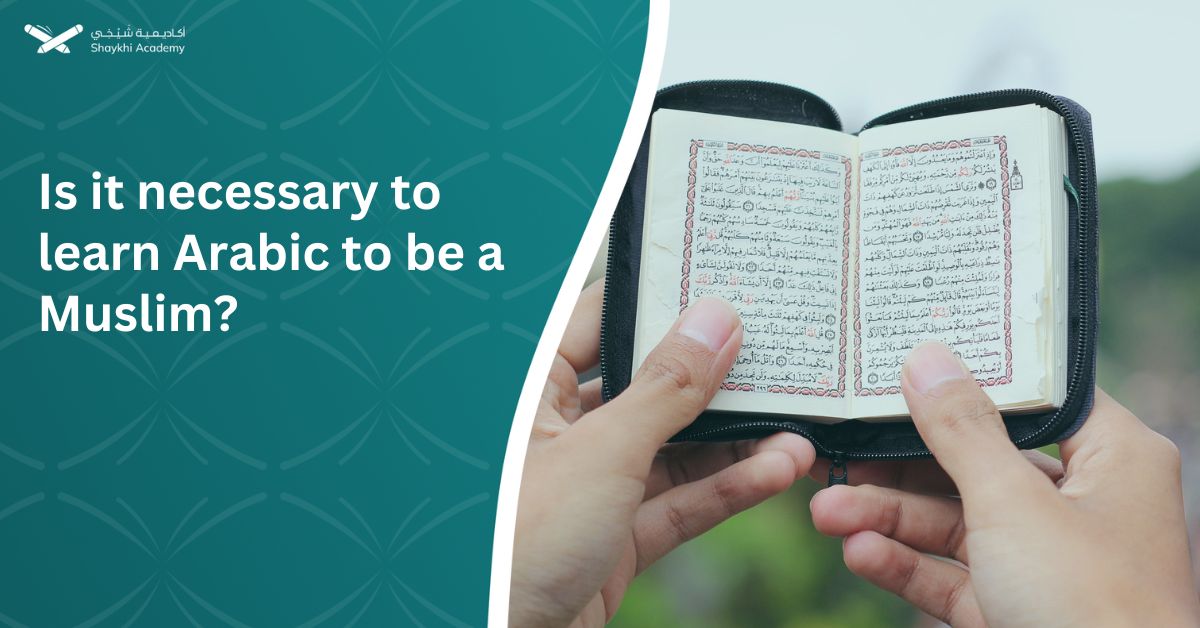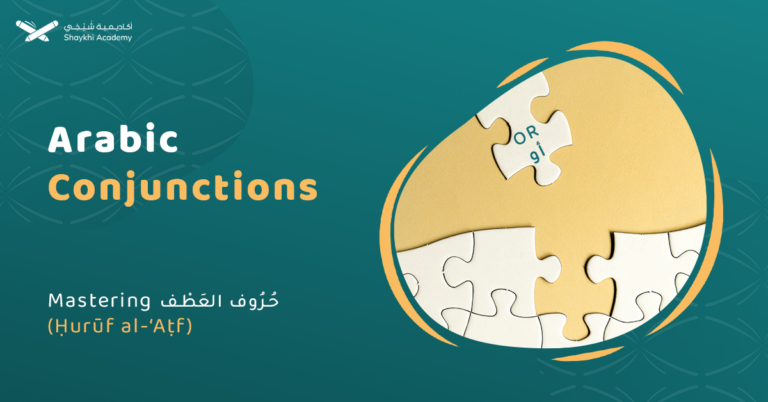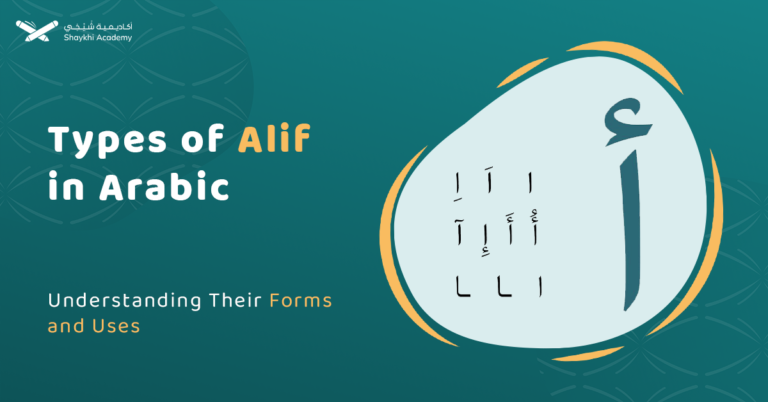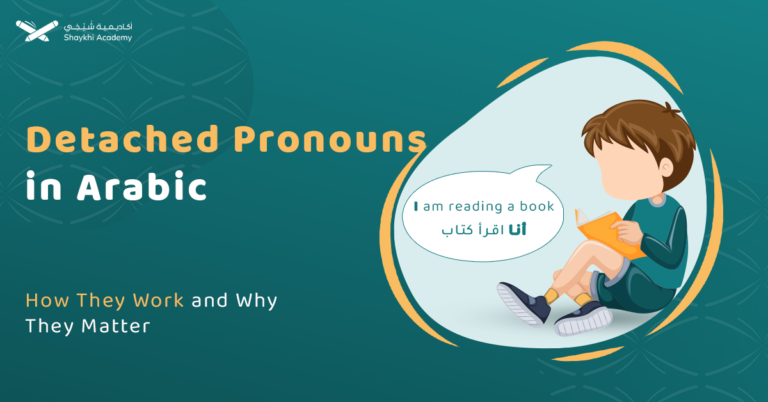The Arabic language takes the honor as it is the language of the Holy Quran, the language of the prophet Mohammed peace be upon him, and of course, it is the language that Muslims must speak during praying and reciting Quran.
But, is it necessary to learn Arabic to be a Muslim? Let’s discuss this important question in this article.
Is it necessary to learn Arabic to be a Muslim?
It is not necessary to learn Arabic to be a Muslim, but it is highly beneficial. Arabic is the language of the Quran and the language used in Salah (prayer), which are central to Islamic practice.
Understanding Arabic allows Muslims to connect more deeply with the Quran’s message and perform acts of worship with greater comprehension and focus. However, non-Arabic speakers can still be devout Muslims by learning Quranic translations and following Islamic teachings in their native language.
While learning Arabic enhances a Muslim’s understanding of the faith, it is not a requirement for entering Jannah (Paradise). The key distinction in Islam is based on Taqwa (piety), not language or ethnicity.
The Prophet Muhammad (peace be upon him) emphasized that no one is superior to another except through piety. Therefore, a non-Arabic-speaking Muslim can achieve righteousness and spiritual closeness to Allah without knowing Arabic, though learning it can deepen their religious experience.
Why Is learning Arabic important for those who embraced Islam?
While it is not mandatory for non-Arab Muslims to learn the Arabic language, it is certainly important.
Learning Arabic enables a deeper understanding of the Quran and aids in memorizing it. Additionally, it is beneficial for studying Fiqh, which contains essential Islamic rulings and principles.
Arabic is a powerful comprehensive language, rich in meaning, and since the Quran should be recited with an understanding of its words and verses, learning Arabic is immensely beneficial in this regard.
If learning Arabic is challenging for some Muslims, they should at least read the translation of the Quran to grasp its meaning.
For example, the word “الحمد” in Surah Al-Fatiha (“الْحَمْدُ لِلَّهِ رَبِّ الْعَالَمِينَ”) can be translated as “thanks” or “praise” but in the Arabic language, it actually encompasses both meanings—thanks and praise.
As mentioned earlier, learning Arabic is not mandatory, but it is important for understanding the true depth and meaning of the Quran.
Three reasons to study Arabic As A Muslim:
Improving one’s Arabic is the key to understanding the Quran. The better your grasp of the meanings of Arabic words, the deeper your comprehension of the Quran’s message.
It is important to note that the Arabic language contains around 12 million words, in contrast to only 500,000 words in English.
Here are some reasons that may encourage you to study Arabic:
1- To understand the Holy Quran:
This profound understanding will ultimately guide you in applying the teachings of the Quran throughout your life.
2- Learning Arabic For A Deeper Understanding of the Quran:
For a deeper understanding of Islam, learning Arabic is invaluable as it aids in comprehending Sharia sciences such as Fiqh, Hadith, and Tafseer. This knowledge not only enhances your grasp of Islamic teachings but also helps in applying what you’ve learned in your daily life and worship practices.
3- Feel The Acts Of Worship
To deeply feel and understand the meaning of words and phrases during acts of worship, such as prayer and Hajj, understanding their meaning helps you to focus and engage more fully while performing these acts of worship.
Why is Arabic the language of Islam?
Arabic is the language of Islam because the Quran was revealed in Arabic, and Arabic is a language known for its richness, complexity, and eloquence. When did this happen? Over 1,400 years ago.
Let’s explore some reasons why Arabic is the language of Islam:
1- The Prophet SAW was An Arab
The language of Prophet Muhammad (peace be upon him) was Arabic. Allah, the Almighty, said:
﴾وَمَا أَرْسَلْنَا مِنْ رَسُولٍ إِلَّا بِلِسَانِ قَوْمِهِ﴿which means, “And We sent not a Messenger except with the language of his people, in order that he might make the Message clear for them. Then Allah misleads whom He wills and guides whom He wills. And He is the All-Mighty, the All-Wise.” (Surah Ibrahim, 14:4).
2- Arabic is the most comprehensive Semitic language:
Arabic is the most comprehensive language out of the Semitic languages, capable of encompassing the meanings of the Quran, unlike some other languages.
3- The Quranic Challenge:
The Quran was revealed in Arabic to challenge the Arabs’ linguistic prowess and achieve the linguistic miracle.
4- Allah’s Choice
Allah chose the Arabs for the revelation of the Quran in their language as an honor and to dignify their tongue.
5- Arabic And the qualities of endurance
The Arabic language possesses the qualities of endurance, making it suitable for the final and everlasting book
6- Pure Language
The Arabic language remained pure and untouched because the Arabs revered and preserved it.
Is Arabic the language of Allah?
Allah (SWT) created all languages and gave us the ability to communicate through them.
Some may believe that Arabic is the language of Allah or the language spoken in Jannah (Paradise), but there is no authentic evidence to support this.
The hadiths that mention such claims are considered fabricated (Mawdu’). Allah (SWT) has not revealed any specific information about the language of Paradise, and He alone knows best.
Can you pray in your own language Islam?
Supplications (du’as) can be made in any language, allowing you to express them in your native tongue. However, when it comes to Salah (prayer), it must be performed in Arabic.
Salah is a form of worship prescribed by Allah, and performing it in Arabic helps preserve the authenticity and protection of the Quran.
Regarding making du’as during Sujood in Salah, if you don’t know Arabic, it’s permissible to do so in your native language. However, it’s also beneficial to memorize some du’as in Arabic that encompass goodness in both this life and the Hereafter, such as the du’a in the verse:
“رَبَّنَا آتِنَا فِي الدُّنْيَا حَسَنَةً وَفِي الآخِرَةِ حَسَنَةً وَقِنَا عَذَابَ النَّارِ”
It means: “Our Lord! Give us in this world that which is good and in the Hereafter that which is good, and save us from the torment of the Fire!”
Can you go to Jannah without knowing Arabic?
As mentioned previously, knowing Arabic as a Muslim can greatly enhance your understanding of the Holy Quran and improve your worship. However, it is not mandatory.
The distinction between Muslims is based on their faith and righteousness, not their language.
The Prophet Muhammad (peace be upon him) said:
“لا فضلَ لعربيٍّ على عجميٍّ ، ولا لعجميٍّ على عربيٍّ ، ولا لأبيضَ على أسودَ ، ولا لأسودَ على أبيضَ إلَّا بالتَّقوَى”
This translates as: “An Arab has no superiority over a non-Arab, nor does a non-Arab have superiority over an Arab. A red-skinned person has no superiority over a dark-skinned person, nor does a dark-skinned person have superiority over a red-skinned person, except through Taqwa (piety).”
Therefore, Taqwa is the standard by which one Muslim is distinguished from another, regardless of their language or ethnicity.
It is essential to note that certain acts of worship, such as Salah, must be performed in Arabic, as every Muslim is required to recite Al-Fatiha and Al-Tashahhud, for example.
Learning Arabic brings a Muslim closer to understanding Islamic rulings (Sharia) and the Sunnah, yet it has not been explicitly stated that learning Arabic is itself part of the Sunnah.
However, the answer to the question remains yes – a non-Arab Muslim can enter Jannah without knowing Arabic.
How to learn Arabic?
Arabic is the language of the Holy Quran. Even if a Muslim is not Arab, learning Arabic will enhance their understanding of the Quran’s words and verses.
It also facilitates the learning of the Sunnah and other Islamic sciences.
Here are some tips for learning Arabic:
1- Take Structured Courses
Taking structured courses with professional tutors, such as those at Shaykhi Academy, will help you learn Arabic in an organized manner, enabling you to gradually develop reading and writing skills.
This approach is more time-efficient than self-study, as tutors offer personalized guidance, correct mistakes promptly, and ensure consistent progress.
2- Practice what you learn regularly
Practicing the words you learn, whether by repeating them, writing them, or speaking with native Arabic speakers in communities, will gradually enhance your language skills over time.
Consistent review and practice are key to building fluency.
3- Immerse yourself in Arabic
- Dive deep into the Arabic language by immersing yourself in its rich soundscape.
- Listen regularly to the Quran, exploring its beautiful recitation and profound meaning while reading the translation.
- Enhance your understanding by listening to explanations of Hadith, Islamic sciences, or even engaging Arabic podcasts.
This immersive approach will not only familiarize you with the language but also deepen your connection to Islamic culture.
Master Arabic with Shaykhi Academy: Your Gateway to Fluency!
Are you eager to learn Arabic from the comfort of your home? Shaykhi Academy offers you the perfect opportunity to master Arabic, whether for Quranic studies, daily communication, or advanced understanding.
Why Shaykhi Academy?
- Expert Native Tutors: Learn from highly qualified native Arabic speakers.
- Flexible Scheduling: Tailor your classes to fit your busy life.
- Affordable Learning: Access top-quality education at a price that suits you.
- Global Access: Study from anywhere in the world.
Explore Our Arabic Courses:
- Noorani Qaida: Build a strong foundation in Quranic Arabic.
- Comprehensive Arabic Courses: Master the Arabic language, from beginner to advanced levels.
- Fusha Arabic Classes: Delve into Modern Standard Arabic, the key to understanding literature, media, and formal communication across the Arab world.
- Quranic Arabic Course: Enhance your connection with the Quran by learning the language in which it was revealed.
Start Your Arabic Journey Today! Whether you’re just starting or looking to deepen your knowledge, Shaykhi Academy is here to support your journey. Book your free trial now and begin your path to Arabic mastery!
Conclusion
While it is not mandatory for non-Arab Muslims to learn the Arabic language, it is certainly important, as Learning Arabic enables a deeper understanding of the Quran and aids in memorizing it.
The better your grasp of the meanings of Arabic words, the deeper your comprehension of the Quran’s message. Some may believe that Arabic is the language of Allah or the language spoken in Jannah (Paradise), but there is no authentic evidence to support this, although Arabic is the language of Prophet Muhammad (peace be upon him).
Supplications (du’as) can be made in any language, allowing you to express them in your native tongue. However, when it comes to Salah (prayer), it must be performed in Arabic. Taqwa is the standard by which one Muslim is distinguished from another, regardless of their language or ethnicity.















































